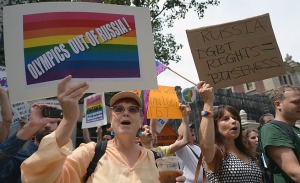
As has been across the news lately Russia has passed a number of laws making it illegal to be gay, or to support gay people or gay rights. This is a really ass backwards thing to have done, there's no debating that ,so I won't.
Famous people like Stephen Fry have petitioned the British Prime Minister and the IOC to boycott the Winter Olympics, or have them moved to another location. This has a LOT of backing.
One openly gay athlete has said the boycott is a bad idea, after all, these athletes work up to this pinnacle oftheir career, and might rather stick with a don't ask / don't tell situation for the duration of the event so as not to miss their shot, possibly their one shot, at Olympic glory.
But I got to thinking, the increasingly alphabet soup of LGBTQ people has more than gay people in it, and I assume there must be Trans athletes out there.
Sure enough a google search brings up a site for trans athletes, and two cases of trans athletes within the Olympics, which is where my 'awkward' questions would be going.
I say awkward because I have a couple trans friends, and at least one reader of my blog is trans and having previously lost a friendship through asking such questions, I have been hesitant to ask any more for fear of a repetition, so instead I've been wallowing in ignorance for some time. That's not good so, Im asking.
The IOC states that a trans athlete can compete in their gender two years after the surgery, apparently this gives time for the body to reach the 'right' levels of estrogen / testosterone etc. Until then athletes are to compete as the gender into which they were born. This leads to the situation of Keelin Godsey who is a pre-op trans man competing with women in the Hammer, he missed uot on going to London as he didn't make the cut although he did throw a personal best. He postponed his surgeries so that hecould have a shot at the olympics (and who would blame him).
Another case that came up when I was googling all of this (I hate to call it research, it's not as intensive as real research) was a MMA fighter, Fallon Fox. She's a trans woman who fights MMA, and it seems that some of the women she'll fight (and the commentators and fans of MMA) object to her competing as a woman, despite complying with the Olympic standards.
Does Fallon's bone density and muscle mass, even two years after reassignment surgery and the various medications she'd have taken in that time, give her an undeniable advantage?
How do trans people feel that in order to compete they have to either wait for two years post surgery, or compete as the wrong gender?
How does that compare with women like Caster Semenya who isn't trans but has high levels of testosterone and has to take treatments to bring her below the 'threshold'?
It seems that the definition of gender in terms of athletics is goverened by threshold levels of testosterone / estrogen and people have to be treated if they don't fit within the levels written down for their gender. Is that fair?
You can't use drugs or anything similar to improve your performance, but if you are naturally a certain way they enforce 'treatments' to bring you back in to a range that they will let perform in?
Does that seem right to you?
I will freely admit, gender and sexuality are subjects I am woefully under educated in, so for the most part I try to apply the same theory as I do to race, religion, and all manner of other things: They're human.
If only the rest of the world could just do the same.
Well I feel educated after reading this :P
ReplyDeleteAnyways... I nominated you for a Leibster award! Bask in your awesomeness and then head on over to my page for the directions. ;)
http://escapingnormal.blogspot.com/2013/08/guess-who-was-nominated-for-whatreposted.html